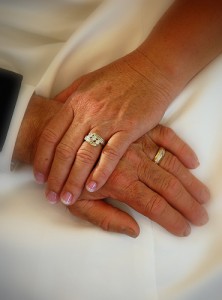 Last night, I was a member of a Quaker clearness committee in support of a friend who is getting married next year. It was the first of several meetings over the course of the fall/winter, during which the group will explore issues in their relationship, and support them going forward into marriage. From what I can tell so far, it’s quite a reflective and open process designed to help couples bring forth any potential challenges to the relationship, as well as highlight strengths, known to the couple and not known to them.
Last night, I was a member of a Quaker clearness committee in support of a friend who is getting married next year. It was the first of several meetings over the course of the fall/winter, during which the group will explore issues in their relationship, and support them going forward into marriage. From what I can tell so far, it’s quite a reflective and open process designed to help couples bring forth any potential challenges to the relationship, as well as highlight strengths, known to the couple and not known to them.
We are a diverse group age-wise. I, my friend, and his partner in our mid-late 30s. There is a couple in their 60s, and two elder women whose husbands have passed on.
As I sat there listening to our different experiences with relationships and marriage, I thought to myself: “How many Americans experience anything remotely like this before getting married?” I am aware that some Christian couples undergo a period of council with a priest before marriage, but the dynamic there seems completely different. It’s not really about sharing and exploring, but more about getting guidance from the minister, who may or may not understand the particular needs of the couple. Beyond some Christian communities, I’m not aware of any set practices around supporting couples getting married over a period of time. I haven’t heard about much of this going on formally in spiritual communities like my Zen center. Surely, there are informal processes happening for certain couples, but nothing established and out in the open like these Quaker committees.
I have been writing a lot about what constitutes the fragmentedness of modern dating, and this fits right in. From meeting online or at some event, to the process of getting married, having children and raising them, so much has become privatized and isolated. If you have trouble in your partnership, you’re support is often limited to a few good friends, family members, or hired therapists. Some don’t even have these people around, due to issues in the family, business, and lack of financial resources. It can be even harder for queer folks, who not only face some of the same issues of isolation, but also continue to experience strong levels of discrimination, despite gains in recent decades. Furthermore, couples and folks living in “non-traditional” relationships, such as open marriages or polyamorous relationships frequently face barriers of understanding that limit who they can turn to for help during crisis.
Given all of this, it seems to me that developing the kind of cross generational support committees, like the one I am participating in, would be a good thing for many couples. They need not be focused around marriage, since some people choose to not be married. They can easily be structured to focus on a current crisis in a long term relationship, or perhaps to support a couple make a major step like having or adopting children. And they need not be connected at all to a religious or spiritual community.
Some folks have the kind of friendship and family support to do this kind of thing informally. Perhaps that’s all that is needed. I have to say that the cross-generational aspect of the committee really appeals to me. Getting views from different stages in life helps balance out the understanding of what is important and what isn’t.
Have any readers experienced something like the Quaker clearness process before? Who do you go to for support and advice when having a relationship crisis or are making a major relationship decision? Do you wish you had more support?
Photo Credit
Wedding Hands @ Flickr


Please Share Your Thoughts - Leave A Comment!